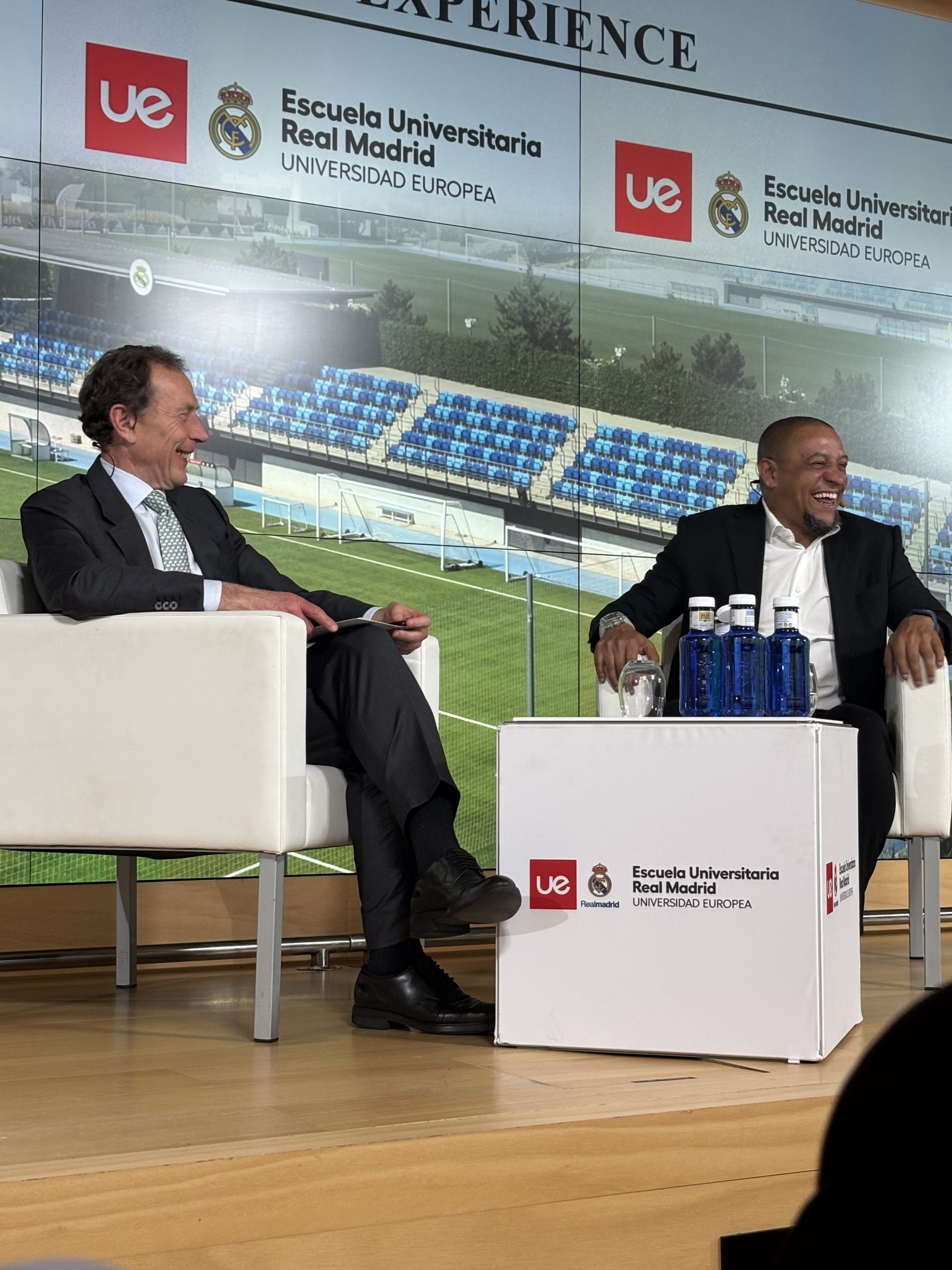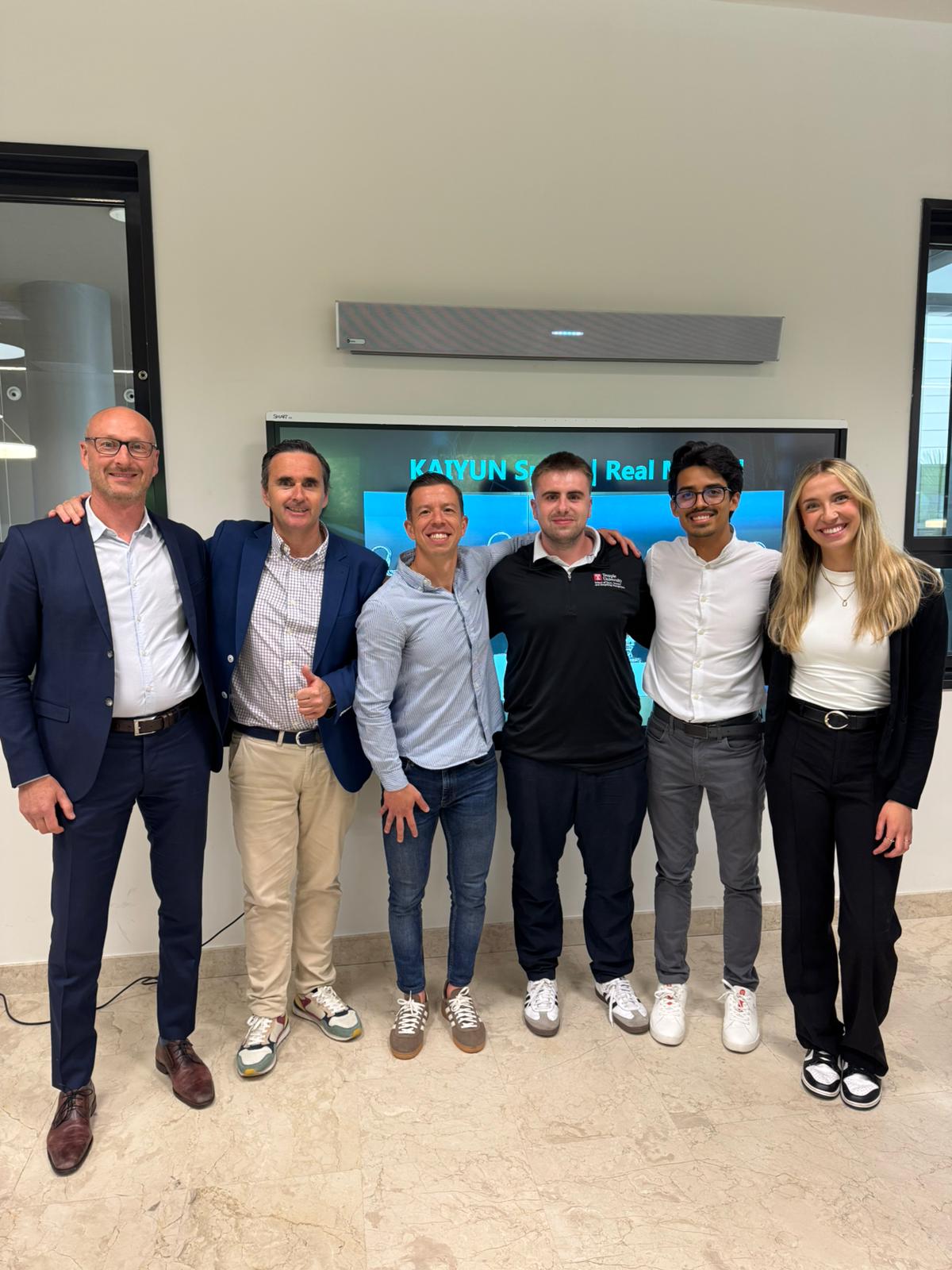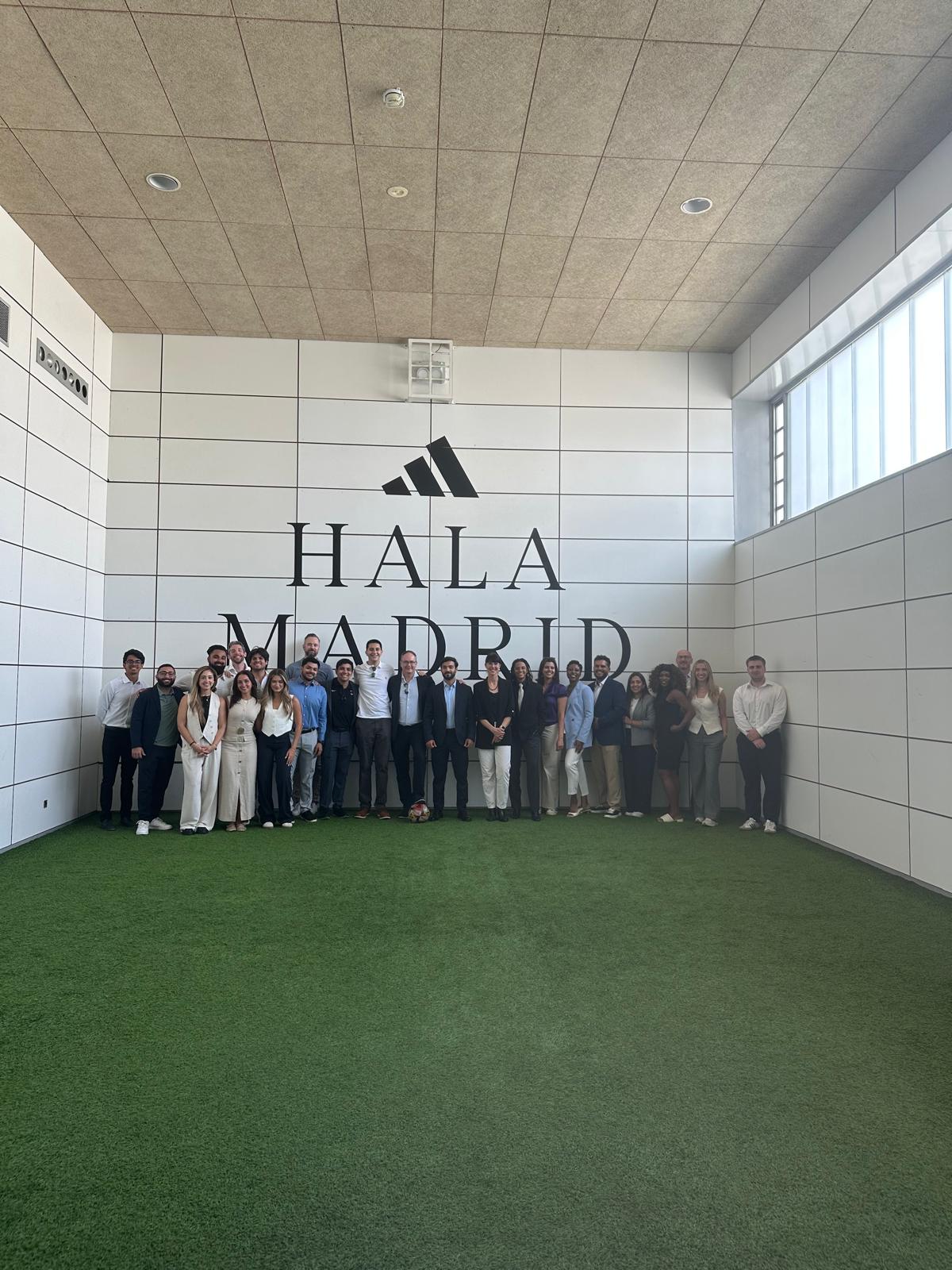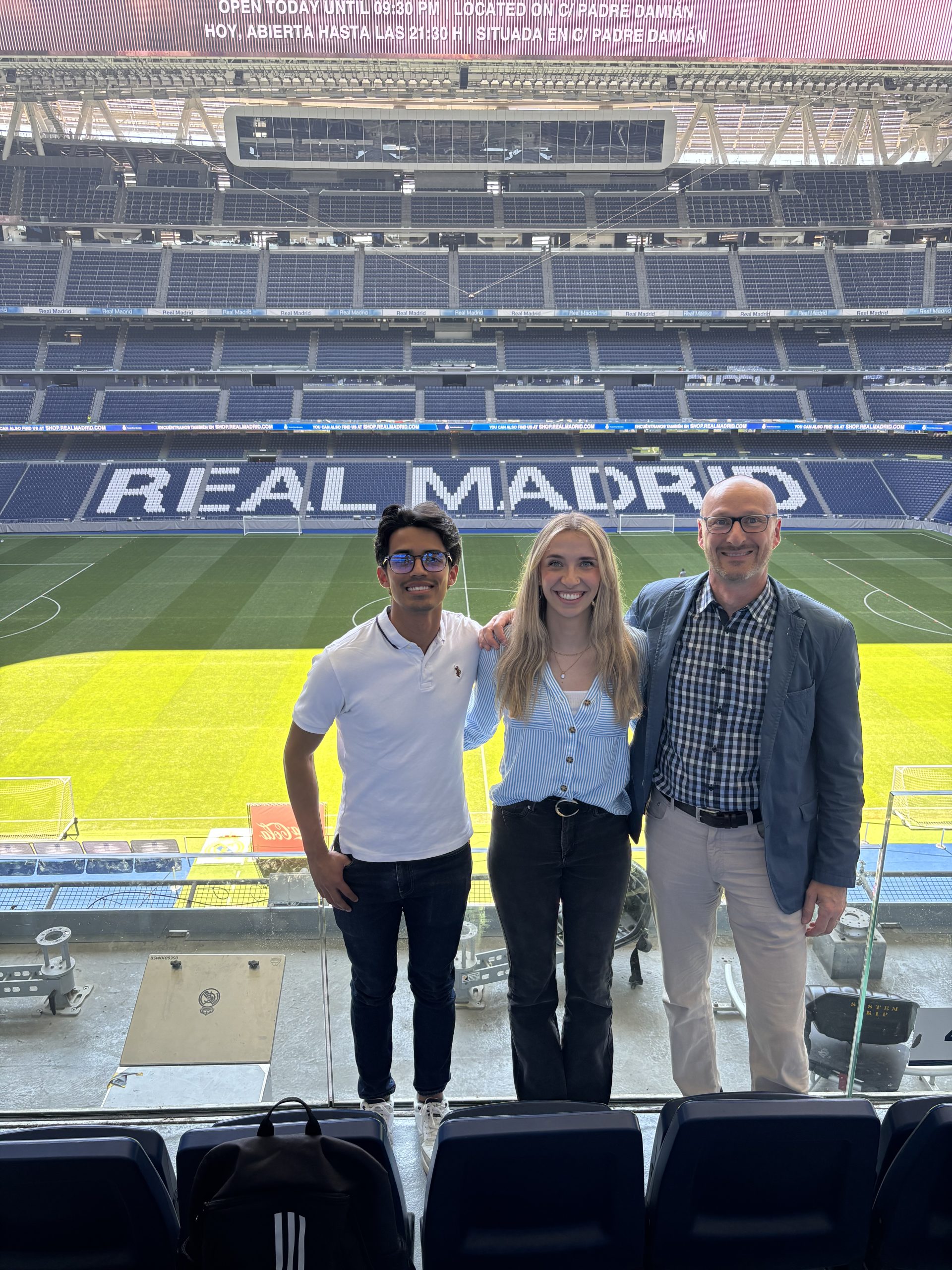Because Philadelphia is one of the country’s most bustling sports towns, Temple University’s School of Sport, Tourism and Hospitality Management (STHM) is well positioned to offer students a wide variety of opportunities to become actively engaged in the sport industry.
One of those opportunities is an exciting dual degree program for graduate students. STHM and Real Madrid Graduate School Universidad Europea in Spain have partnered to offer graduate students at STHM pursuing a master of science in sport business the opportunity to also earn an EMBA in sport management from Real Madrid Graduate School Universidad Europea.
As a global brand, this partnership offers students additional exposure to the billion-dollar sport industry, especially the European market.
Jointly owned by Real Madrid and Universidad Europea, the university serves as the official academic brand of Real Madrid. Students in the dual degree program learn from renowned sports leaders and executives from Real Madrid. This, paired with the global network of connections students build—from peers and professionals to an optional two-week immersion trip to Madrid—creates immeasurable networking value.

The two-year program begins with coursework at Temple, with Real Madrid Graduate School Universidad Europea faculty teaching the eMBA classes online over the summer between their first and second years, and again in their last semester. An optional component of the program is a two-week immersion trip to Spain, where students gain in-person insight into the global sport industry.
Two current dual degree students, Alina Hoburg and Juan David Salas Sanabria participated in the two-week immersion trip this past summer. Read on to learn more about the program and their experience!
Why did you choose Temple/STHM as your grad school?
AH: I chose STHM because I felt like it had the right resources to prepare me for my future. The Real Madrid Graduate School Universidad Europea program was also part of the reason I chose STHM, as it aligns with my expertise in European football and my future goals. Being able to gain two degrees in two years from two such respected institutions was a no-brainer for me. Another reason why I chose Temple was its location. Philly is such a great city if you want to work in the sport industry, with all its professional teams, endless opportunities, and respected industry professionals.
JDSS: I chose Temple and STHM mainly because of the dual degree. It has enabled me to apply and understand the academic studies with practical applications. Thanks to it, I’ve been able to build a network, develop a global mindset and immerse myself in the sport industry.

Caption: Rick Turner (MSSB student), Alfonso Roberes de Cominges, Lucas Campoy, Ben Turland (MSSB student), Juan David Salas Sanabria and Alina Hoberg join Arowana CEO Alfonso Roberes de Cominges and Head of Partnerships at Arowana Lucas Campoy. (Photo courtesy of Alina Hoberg)
What was the most memorable part of your trip to Madrid?
AH: The most memorable part of my trip was probably the connections I made along the way. I got to meet so many professionals who work for Real Madrid or partner with Real Madrid in various ways. I also got to meet so many other amazing students from other universities all across the US. I feel like those are the connections that are going to last a lifetime. Of course, it was also amazing to get to see the behind the scenes of one of the biggest clubs in the world. We got to learn about all the amazing projects that Real Madrid is currently working on, and it felt like we were part of the process, as none of this information is available to the public yet.
JDSS: The highlight of the trip was the visit to Ciudad Real Madrid. To walk through the club’s facilities and hear about their business strategies from their top executives was to gain an inside look at how a world-class organization operates behind the scenes. Yet it was also the little things, the bonding with classmates, the learning to navigate a new culture, and the consideration of sport’s global reach, that combined to make the experience so great.

Caption: Juan David Salas Sanabria (left), Alina Hoberg (second in from right) visit with the entire FIU and Temple cohort at the Ciudad de Real Madrid (Real Madrid training center). (Photo courtesy of Alina Hoberg)
If you were speaking to an incoming student, what advice would you give them in regard to this specific program?
AH: The biggest advice I could give is to make those connections, ask those questions and follow up with the professionals on LinkedIn, since you never know where you might end up in the future and who might be able to help you along the way. They are all incredible people, who have already achieved so much in their careers, and they were all open to talk and connect with us, so use the opportunity!
JDSS: Maximize every experiential learning experience available in this dual program. If it’s the Real Madrid Graduate School Universidad Europea immersion or interacting with professors and classmates from all over the world, the worth is in the connections you make and the mentality you develop. Remain curious and remain open.
What are the advantages of having a dual degree in these areas of study?
AH: For me personally, the biggest advantage of this program is having a respected US degree and an international degree, which allows me to gain different perspectives on the sport industry. While the STHM degree gives you a broad look at the sport industry as a whole, the Real Madrid Graduate School Universidad Europea degree gives a more in-depth perspective on the European sport industry, specifically in terms of football (soccer). This not only broadens your academic horizon, but it also allows you to learn from industry professionals from all over the world.
What added value does the Real Madrid Graduate School Universidad Europea program bring to your experience and your degree?
JDSS: The Real Madrid Graduate School Universidad Europea program puts real-world context into the classroom. Being able to visit their facilities, speak with club executives, and deconstruct their strategic operations enabled me to bridge the gap between theory and reality. Also, the classes from Universidad Europea that complement the curriculum have given me a whole new perspective on how to run and manage sporting organizations.
How are you able to balance the workload, classes, etc., in a dual degree program?
AH: I will say it is not too hard to manage, since the classes don’t overlap. Real Madrid Graduate School Universidad Europea classes start as soon as Temple classes finish, so it is definitely manageable. With Real Madrid classes being online, it gives you the opportunity to be on your own timing, since you can watch classes back if you did not have the chance to join live.
JDSS: Prioritization and time management have been essential. I plan my schedule like a professional timeline, charting deadlines and dividing elaborate assignments into smaller steps. Faculty and peer support also make a great difference; there’s a team-oriented environment that keeps everyone going.
In what ways has your dual-degree experience enhanced your opportunities for internships/job placement?
AH: I believe that the dual degree is already setting me up for success, whether that is in the United States or in Europe. Having two degrees from two different continents can really help you bring a unique perspective to the table, and it also allows you to make connections that can later be of help once you enter the job market.
JDSS: It’s made me stand out when networking with potential employers. International exposure, along with rigorous analytical training, set me up to make a valuable contribution to teams working on performance metrics and strategic planning. I’ve had the ability to work with collegiate and Paralympic teams, and each experience has built upon the platform this program offers.
If applicable, please share a challenge you faced and how you used the resources available to you to overcome it.
AH: The only challenge I have faced so far was the time of the Real Madrid Graduate School Universidad Europea classes. Due to the time difference, classes are usually around 1-3 p.m., which can be a challenge if you have a daytime job. However, as I already mentioned, the program is completely online and very flexible. If you can’t attend a class live, you can simply watch it back.
JDSS: As an international student, adjusting to different academic systems and expectations between institutions was initially challenging. But I relied on my professors, consulted student advisors and connected with classmates on both sides of the program. That support enabled me to acquire the communication and adaptability skills I now view as fundamental to my success.
What’s next for you?
AH: I will be attending Temple for my last semester this fall and then I will finish my Real Madrid Graduate School Universidad Europea classes next spring. However, I will already start applying to jobs for next year and hopefully be able to be a part of the FIFA World Cup next year in Philly.
JDSS: I’m focused on finishing my degrees strong and building my work in sport analytics, especially for soccer. I’m looking for internship opportunities in which I can model performance data into actual team operations, and I look forward to joining conversations about innovation in sport. Ultimately, I want to assist organizations in making more intelligent, data-driven decisions.
For more information on how to participate in this dual-degree program, visit the program page.
